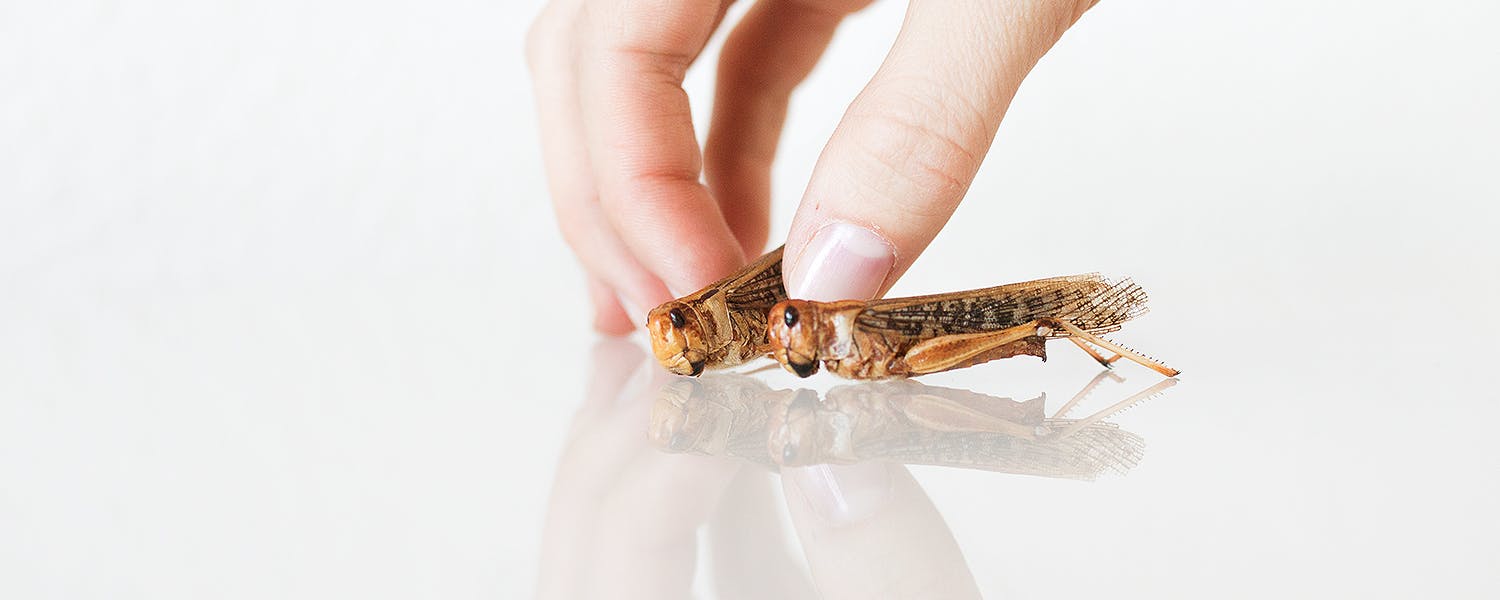How safe is it to eat insects?
14 June 2020
5 min read

Edible insects are on the rise. As mentioned in our edible insects are getting more and more attention in the Western world, even though acceptance of them is still lagging. Now we don't want to delve any deeper into why we should all eat insects - but if you feel like a reminder we also wrote a . So no more convincing and advocating the superpowers of insects, this blog post is all about your own health! Since many people still associate insects with diseases, pests and plagues, it is time to figure out how safe it is to eat insects.
Uncertainty
Farming insects on the large and industrial scale that we are definitely rooting for is a very recent if not even futuristic thing. Looking for information about the safety of edible insects, thus, mostly leads to the sentence: "more research is required". Recent studies investigating the opportunities and obstacles of edible insects, finish off with a bunch of questions that need to be addressed in the future [1, 2]. But what do we know for sure already?
Regulations
Strict regulations apply to any business that produces and commercializes food or feed in the European Union [3]. And insect farming is no exception. The EU has defined an entire package of legislative texts with principles and standards that every business has to adhere to. The important regulations for food producers are known as the General Food Law, the Hygiene Package (consisting of several regulations) and finally also is the Animal Health Law.
These are all in place not only for the safety of us as consumers but also to safeguard the health of the animals. Now we kindly invite you to sit back and take a couple hours on a rainy day to read through all the chapters and articles in the regulations but what it basically boils down to is that producers need to ensure their products are safely produced. For example, insects can only be fed with materials of vegetal origin and producers need to ensure the insects are kept in good health to prevent the spreading of diseases [3].
Quarantine
Google 'insect farming' or 'cricket farming' and you get a lot of images of individual boxes filled with insects. This is also how insect farming is done on larger scales - maybe just a little more professional. Basically, the insects live in a form of "one-species-quarantine" where they only come in touch with other insects of their own species.
Just remember the time during the coronavirus, where staying at home kept us safe from the virus. Since the insects you'll be eating have been in quarantine basically all the time, they are not contaminated with anything, have only been fed properly by farmers, and have been healthy and (hopefully) happy.
Disease-Free
Globally, there are about 1900 species of edible insects that are consumed. In Europe, so far we are sticking to primarily four types of insects that are farmed and produced for human consumption: crickets, grasshoppers, mealworms and buffalo worms.
Although definitely not true for insects in general, these four insects have somthing good in common: they do not carry any zoonotic diseases. Zoonotic diseases are those that are passed on to humans by animals by for example eating contaminated meat or produce or a mosquito or tick bite [4]. None of this is possible, however, with the insects currently farmed in the EU.
Awesome immune system
One of the biggest problems in the meat industry at the moment is the use of antibiotics in livestock farming [5]. Many animals "live" in such tough and unnatural conditions that would naturally make them sick if it were not for antibitiocs. And thus they get a lot of it to prevent them from getting ill or dying. This, in turn, poses a problem for humans as our antibiotics resistance is rising (which is only partially because of this).
Insects, on the other hand, have a strong immune system and do not need any antibiotics while farming them. We see a win-win situation: fewer bad living conditions for animals and more antibiotics resistance for you!
Allergies
So far everything we do know about edible insects and farming seems safe. And even though we know it is (so far we've lived to tell the tale) there is a word of caution for those with a shellfish or nuts allergy. Many allergic reactions are caused by chitin, which is the material the exoskeleton of both shellfish (like shrimps, crabs, lobsters etc.) and insects is made of. Eating insects could therefore invoke the same allergic reaction as eating shellfish. So don't immediately eat all of the crawlers you can find if you know you're allergic to shellfish!
Conclusion
So to sum it up: insect farming is regulated under the same laws and standards as any other food producer in the EU, they are farmed in quarantine to prevent any form of contamination, do not carry any diseases they can transfer onto humans and they do not need antibiotics. Even though there are still questions out when scaling up insect farming, we feel equally safe eating insects as anything else!
- Dobermann, D., Swift, J. A., & Field, L. M. (2017). Opportunities and hurdles of edible insects for food and feed. Nutrition Bulletin,42( 4), 293-308.
- EFSA Scientific Committee. (2015). Risk profile related to production and consumption of insects as food and feed. EFSA journal,13 (10), 4257.
- IPIFF. Insects as Food & Feed: EU Legislation. Accessed June 13th, 2020 at https://ipiff.org/insects-eu-legislation/
- Healthline. Zoonosis. Accessed June 13th, 2020 at https://www.healthline.com/health/zoonosis
- Bugsfeed. Is it dangerous to eat insects? Accessed June 13th, 2020 at http://www.bugsfeed.com/are_they_dangerous
